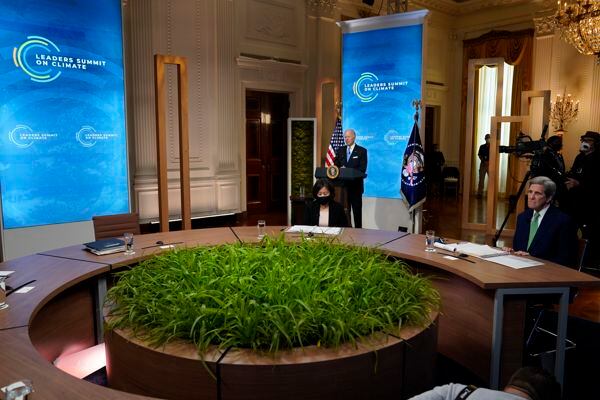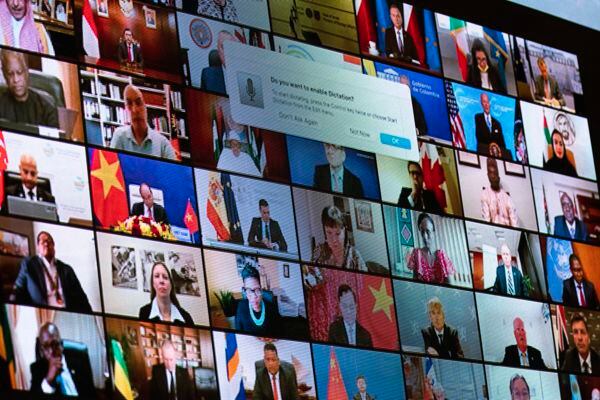By Ellen Knickmeyer, Christina Larson, and Matthew Daly
World leaders joined President Joe Biden Friday to close his virtual climate summit with stories of their own national drives to break free of climate-wrecking fossil fuels — Kenyans leapfrogging from kerosene stoves to geothermal power and Israeli start-ups scrambling to improve battery storage.
“We’re gonna do this together,” Biden exhorted, speaking live to a Zoom-style screen of leaders of national governments, unions and business executives around the world.
Biden's closing message echoed the sentiments of Kenyan President Uhuru Muigai Kenyatta, who told the summit: “We cannot win this fight against climate change unless we go globally to fight it together.”
The second and final day of Biden's summit of 40 world leaders made the case for massive investment now — in the U.S. and around the world — for prosperous as well as cleaner economies in the long run.
Compared with the United States and other wealthy but carbon-dependent nations, Kenya stands out as a poorer nation closing the technology gap despite limited financial resources. It has moved in decades from dirty-burning coal, kerosene and wood fires to become a leading user and producer of geothermal energy, wind and solar power, all aided by mobile-phone banking.

The summit's opening on Thursday saw a half-dozen nations, including the United States, pledge specific, significant new efforts to cut emissions. Other summit speakers, including Chinese President Xi Jinping, whose country is the world's top climate polluter, held out the possibility of deepening their commitments, in China's case by easing back on building of coal-fired plants.
Biden's own pledge, nearly doubling the U.S. target for cutting emissions from coal and petroleum this decade, depends on his keeping political support from voters and securing more than $2 trillion for a nationwide infrastructure overhaul.
“The commitments we've made must become real,” Biden said Friday, speaking to the home audience as much as the international one. “Commitment without doing anything is a lot of hot air, no pun intended."
He wondered aloud if there was “anything else you can think of that could create as many good jobs going into the 21st century.”
The coronavirus pandemic forced the summit into its virtual format, with a TV talk show-style set created in the White House East Room. Cabinet secretaries stepped in as emcees to keep the livestreamed action moving.

It was all in service of an argument officials say will make or break Biden’s climate vision: Pouring trillions of dollars into clean-energy technology, research and infrastructure will speed a competitive U.S. economy into the future and create jobs while saving the planet.
While technological development and wider use has helped make wind and solar power strongly competitive against coal and natural gas in the U.S., Biden said investment also would bring forward thriving, clean-energy fields “in things we haven’t even thought of so far.”
Republicans are sticking to the arguments that then-President Donald Trump made in pulling the U.S. out of the 2015 Paris climate accord. They point to China as the world’s worst climate polluter — the U.S. is No. 2 — and say any transition to clean energy hurts American oil, natural gas and coal workers.
It means “putting good-paying American jobs into the shredder,” Senate Minority Leader Mitch McConnell, R-Ky., said on the Senate floor Thursday in a speech in which he dismissed the administration’s plans as costly and ineffective.
Much of the proposed spending to address climate change is included in Biden’s infrastructure bill, which would pay for new roads, safe bridges and reliable public transit, while boosting electric vehicles, clean drinking water and investments in clean energy such as solar and wind power.
Biden’s plan faces a steep road in the closely divided Senate, where Republicans led by McConnell have objected strongly to the idea of paying for much of it with tax increases on corporations.
The White House says administration officials will continue to reach out to Republicans and will remind them that the proposal’s ideas are widely popular with Americans of all political persuasions.
Friday also featured billionaires Bill Gates and Mike Bloomberg, steelworker and electrical union leaders and executives for solar and other renewable energy.
“We can’t beat climate change without a historic amount of new investment,” said Bloomberg, who has spent heavily to promote replacing dirty-burning coal-fired power plants with increasingly cheaper renewable energy.
Biden envoy John Kerry stressed the political selling point that the president’s call for retrofitting creaky U.S. infrastructure to run more cleanly would put the U.S. on a better economic footing long-term. “No one is being asked for a sacrifice,” Kerry said. “This is an opportunity.”
Global leaders described their own investments and commitments to break away from reliance on climate-damaging petroleum and coal. Prime Minister Benjamin Netanyahu described scientists at hundreds of Israeli start-ups working to improve crucial battery storage for solar, wind and other renewable energy. Prime Minister Mette Frederiksen of Denmark renewed her country's pledge to end oil and gas exploration in the North Sea, switching from offshore oil and gas rigs to wind farms.
On the summit's opening day Thursday, Biden pledged the U.S. will cut fossil fuel emissions as much as 52% by 2030. South Korea, Japan, Canada and South Africa also joined in specific new emissions efforts timed to the summit.
Biden's new goal puts the United States among the most ambitious nations in curbing climate change, the Rhodium Group, an independent research organization, announced overnight.
Different nations use different base years for their emission cuts so comparisons are difficult and can look different based on baseline years. The Rhodium Group said using the U.S.-preferred 2005 baseline, America is behind the United Kingdom but right with the European Union. It’s ahead of a second tier of countries including Canada, Japan, Iceland and Norway.
___
Seth Borenstein contributed from Washington. Knickmeyer reported from Oklahoma City.
Updated on April 23, 2021, at 2:24 p.m. ET with the latest details.












